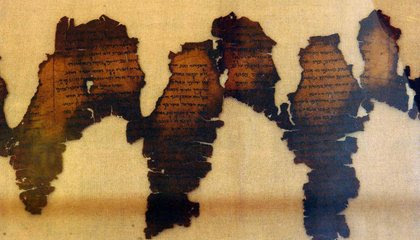When I Survey the Wondrous Cross | Isaac Watts
-
When I Survey the Wondrous Cross 
"Christ Carrying the Cross" (1490-1491) by Sandro BotticelliGenre Hymn Written 1707 Text Isaac Watts Based on Galatians 6:14 Meter 8.8.8.8 (L.M.) Melody "Rockingham" arranged by Edward Miller, "Hamburg" by Lowell Mason, and others The hymn, "When I Survey the Wondrous Cross", was written by Isaac Watts, and published in Hymns and Spiritual Songs in 1707. It is significant for being an innovative departure from the early English hymn style of only using paraphrased biblical texts, although the first two lines of the second verse do paraphrase St Paul at Galatians 6:14. The poetry of "When I survey..." may be seen as English literary baroque.[1]Text[edit]
1. When I survey the wond'rous Cross
On which the Prince of Glory dy'd,
My richest Gain I count but Loss,
And pour Contempt on all my Pride.
2. Forbid it, Lord, that I should boast,
Save in the Death of Christ my God:
All the vain Things that charm me most,
I sacrifice them to his Blood.
3. See from his Head, his Hands, his Feet,
Sorrow and Love flow mingled down!
Did e'er such Love and Sorrow meet?
Or Thorns compose so rich a Crown?
4. His dying Crimson, like a Robe,
Spreads o'er his Body on the Tree;
Then am I dead to all the Globe,
And all the Globe is dead to me.
5. Were the whole Realm of Nature mine,
That were a Present far too small;
Love so amazing, so divine,
Demands my Soul, my Life, my All.The second line of the first stanza originally read "Where the young Prince of Glory dy'd". Watts himself altered that line in the 1709 edition of Hymns and Spiritual Songs, to prevent it from being mistaken as an allusion to Prince William, Duke of Gloucester, the heir to the throne who died at age 11.[citation needed]The hymn's fourth stanza ("His dying crimson...") is commonly omitted in printed versions, a practice that began with George Whitefield in 1757.[2]In the final stanza, some modern variations substitute the word "offering" for "present" to sound more religious.
Listen to King's College Choir, free, on their website:
http://bit.ly/kingslisten
此詩完整翻譯版本〈每逢思量奇妙十架〉,參考顧敦鍒的〈復活節名歌及其本事〉,刊登在《葡萄園》第12期,1960年4月
"Survey"翻譯成"思量",可以討論:
此詩完整翻譯版本〈每逢思量奇妙十架〉,參考顧敦鍒的〈復活節名歌及其本事〉,刊登在《葡萄園》第12期,1960年4月
"Survey"翻譯成"思量",可以討論:
VERB
[WITH OBJECT]- 1Look closely at or examine (someone or something)‘her green eyes surveyed him coolly’‘I surveyed the options’
- 2Examine and record the area and features of (an area of land) so as to construct a map, plan, or description.‘he surveyed the coasts of New Zealand’
- 2.1British Examine and report on the condition of (a building), especially for a prospective buyer.‘the cottage didn't look unsafe, but he had it surveyed’
- 2.1British Examine and report on the condition of (a building), especially for a prospective buyer.
- 3Investigate the opinions or experience of (a group of people) by asking them questions.‘95 per cent of patients surveyed were satisfied with the health service’
- 3.1Investigate (behaviour or opinions) by questioning a group of people.‘the investigator surveyed the attitudes and beliefs held by residents’
- 3.1Investigate (behaviour or opinions) by questioning a group of people.
NOUN
- 1A general view, examination, or description of someone or something.‘the author provides a survey of the relevant literature’
- 1.1An investigation of the opinions or experience of a group of people, based on a series of questions.‘a survey conducted by Gardening Which?’
- 1.1An investigation of the opinions or experience of a group of people, based on a series of questions.
- 2British An act of surveying a building.‘the building society will insist that you have a survey done’
- 2.1A written report detailing the findings of a building survey.‘the third type of report is a full structural survey’
- 2.1A written report detailing the findings of a building survey.
- 3An act of surveying an area of land.‘the flight involved a detailed aerial survey of military bases’
- 3.1A map, plan, or detailed description obtained by surveying an area.‘Other surveys were recently on view at the Fine Art Society in London and the National Museum, Cardiff, Wales.’
- 3.2A department carrying out the surveying of land.‘the British Geological Survey’
- 3.1A map, plan, or detailed description obtained by surveying an area.
Origin
Late Middle English (in the sense ‘examine and ascertain the condition of’): from Anglo-Norman French surveier, from medieval Latin supervidere, from super- ‘over’ + videre ‘to see’. The early sense of the noun (late 15th century) was ‘supervision’.
[動]【全体を見る】
- 1他〈人・場所を〉見渡す,見まわす
- 2他〈状況・学問の分野などを〉概観する,ざっと眺める
- 3他〔しばしば受身形で〕〈世論・情勢・人口などを〉調査する
- 4他((英))〈家屋などを〉調査[検分]する,査定評価する;他自(土地などを)測量する
━━/sə́ːrvei/名(複~s)C
- 1見渡すこと
- 2概観,通覧
- a survey
- ヨーロッパ史概論
- 3(世論・動向などの)調査
- a survey
- 調査を行う
- a survey
- その問題を検討する
- 4((英))(家屋などの)検分,査察(評価)≪on≫;調査書[表]
- 4a(土地などの)測量,測量地;測量図;測量機関
- 語源
- [原義は「上から見る」]


:focal(1043x624:1044x625)/https://public-media.si-cdn.com/filer/1a/71/1a716609-c378-426c-99df-23efb2bd8f4c/gettyimages-2093152.jpg)
